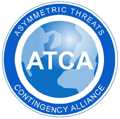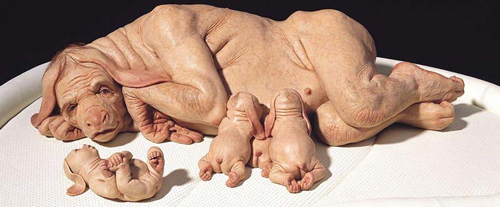
Human-Animal Synthetic Organisms:
Asymmetric Threats
London, UK - 24th March 2008, 22:07 GMT
Dear ATCA Colleagues
[Please note that the views presented by individual contributors
are not necessarily representative of the views of ATCA, which is neutral.
ATCA conducts collective Socratic dialogue on global opportunities and threats.]
After 10 years of stem cell research, scientists are now
facing difficulty with cell therapy from the present human embryonic stem
cell experimentation. The next phase involves human-animal combinations
via Chimeras, Hybrids and Cybrids.
1. A Chimera is produced when a human embryo is fused with an animal embryo;
2. An Hybrid is produced when a human female egg is fertilised with animal
sperm or vice-versa; and
3. A "Cybrid" is produced when an animal cell's genetic material
is removed and replaced with human genetic material.
Some key questions arise:
1. Should human genetic material be fused with animal cells to create clones
of hybrids and cybrids for research?
2. Are human body replacement parts which are part human and part animal
appropriate?

Patricia Piccinini's "The Young Family"
reflects on the perils of creating human-animal synthetic organisms
[CONTINUES]
[ATCA Membership]
[ENDS]
To reflect further on this, please click here
and read views as well as respond directly within the online forum.
We welcome your thoughts, observations and views. Thank you.
Best wishes
ATCA: The Asymmetric Threats
Contingency Alliance is a philanthropic expert initiative founded
in 2001 to resolve complex global challenges through collective
Socratic dialogue and joint executive action to build a wisdom
based global economy. Adhering to the doctrine of non-violence,
ATCA addresses asymmetric threats and social opportunities arising
from climate chaos and the environment; radical poverty and microfinance;
geo-politics and energy; organised crime & extremism; advanced
technologies -- bio, info, nano, robo & AI; demographic skews
and resource shortages; pandemics; financial systems and systemic
risk; as well as transhumanism and ethics. Present membership
of ATCA is by invitation only and has over 5,000 distinguished
members from over 120 countries: including 1,000 Parliamentarians;
1,500 Chairmen and CEOs of corporations; 1,000 Heads of NGOs;
750 Directors at Academic Centres of Excellence; 500 Inventors
and Original thinkers; as well as 250 Editors-in-Chief of major
media.
The Philanthropia, founded in 2005, brings together over
1,000 leading individual and private philanthropists, family offices,
foundations, private banks, non-governmental organisations and
specialist advisors to address complex global challenges such
as countering climate chaos, reducing radical poverty and developing
global leadership for the younger generation through the appliance
of science and technology, leveraging acumen and finance, as well
as encouraging collaboration with a strong commitment to ethics.
Philanthropia emphasises multi-faith spiritual values: introspection,
healthy living and ecology. Philanthropia Targets: Countering
climate chaos and carbon neutrality; Eliminating radical poverty
-- through micro-credit schemes, empowerment of women and more
responsible capitalism; Leadership for the Younger Generation;
and Corporate and social responsibility.
Intelligence Unit | mi2g | tel +44 (0) 20 7712 1782 fax +44
(0) 20 7712 1501 | internet www.mi2g.net
mi2g: Winner of the Queen's Award for Enterprise in the category
of Innovation
|

